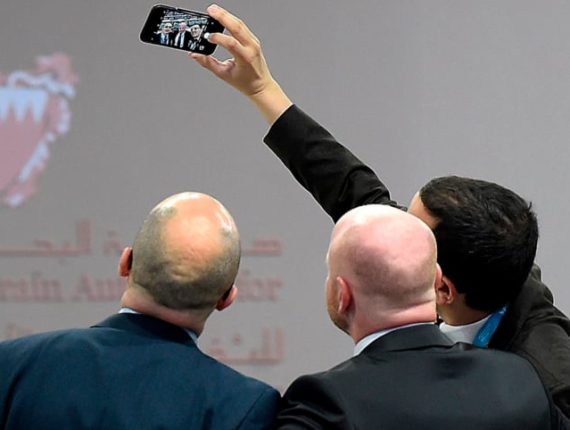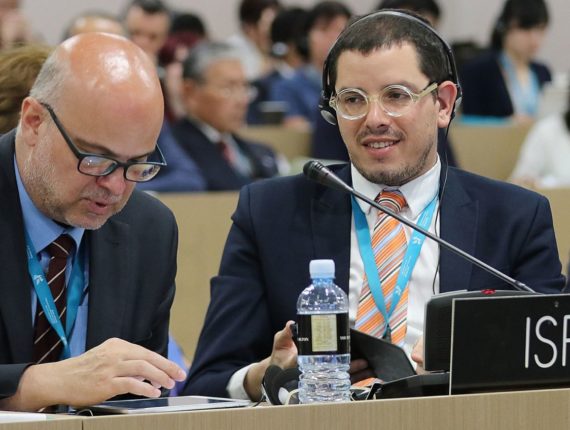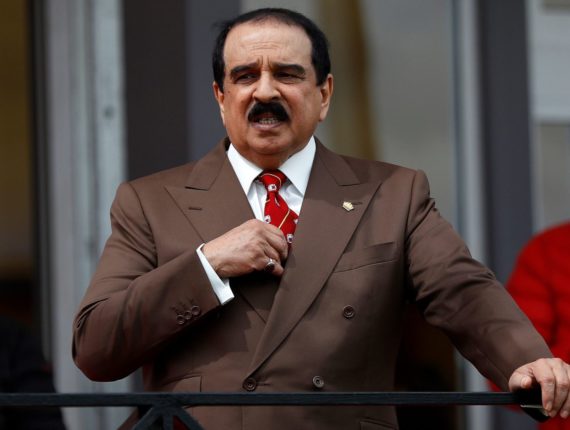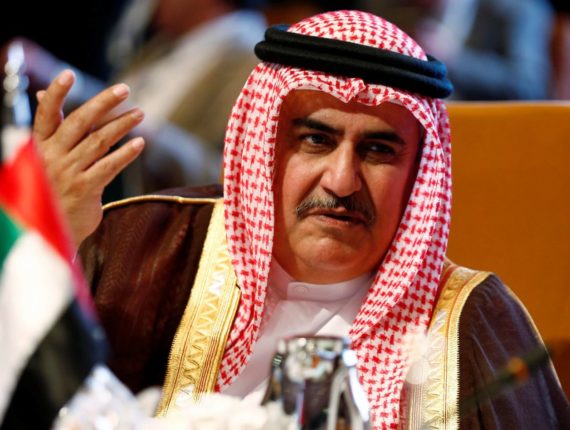
Haaretz
Amir Tibon
Jul 01, 2018 8:30 PM
Relations are warming between Bahrain and Israel, but don’t expect full diplomatic ties anytime soon, say officials

Members of the Israeli delegation take a selfie during the opening session of UNESCO’s 42nd session of the world heritage meetings, in Manama, Bahrain, June 25, 2018. Credit-/AFP
An Israeli delegation last week visited an Arab country that officially doesn’t have diplomatic relations with Israel. The Israeli diplomats were in the Gulf island of Bahrain for an international conference organized by UNESCO (the United Nations agency dealing with cultural heritage). Though symbolic, their participation marks a shift in the kingdom’s ties to Jerusalem – which traditionally receives the cold shoulder from such Arab states.
Bahrain has been hosting the 42nd session of the UN agency’s World Heritage Committee, which runs through July 4. As part of its responsibilities as host country, it gave assurances that Israel would be able to send representatives to the conference.
This is no trivial decision. Arab countries that don’t officially recognize Israel have insisted over the years on not granting entry to Israelis, even when hosting major international events. One recent example: Saudi Arabia, Bahrain’s neighbor and strategic ally, which refused to allow the Israeli team to enter when it hosted an important international chess tournament last December.
Bahrain chose a different policy. Its decision to allow the Israeli delegation in to attend the UNESCO conference serves the tiny kingdom’s international interests, but it could also signal a shift with regard to its treatment of the Jewish state.
Experts in Washington told Haaretz that even though official relations between the two countries aren’t “around the corner,” ties are indeed getting warmer.

The Israeli delegation attending UNESCO’s 42nd session of the world heritage meetings in the Bahraini capital of Manama, June 29, 2018. Credit-/AFP
Regional interests
Though Bahrain, like Saudi Arabia, does not have diplomatic relations with Israel, it does share Israel’s concerns about Iran’s influence in the region.
One notable sign of Bahrain’s changing approach toward Israel came in May, after Iranian forces in Syria fired more than a dozen missiles at Israeli targets on the Golan Heights. Bahrain’s foreign minister, Khalid bin Ahmed Al Khalifa, came to Israel’s defense, writing on his Twitter account that Israel, like any other country, has a right to defend itself against Iranian aggression. His statement was a highly unusual expression of support toward Israel from an Arab country.
“This was an incredible statement and a sign of the new realities emerging in the Middle East,” a senior official in the Trump administration told Haaretz last month. The same official added that the administration is supportive of any steps to improve relations between Israel and neighboring Arab states – such as Bahrain – that share a common enemy in Iran.
The tweet, the official emphasized, was an independent Bahraini initiative and not a result of any American involvement.
“It makes a lot of sense for Bahrain and Israel to increase their cooperation,” says Jonathan Schanzer, from Washington-based think tank the Foundation for Defense of Democracies.
Schanzer visited Bahrain last year and heard from senior officials in the tiny country – whose population is about 1.6 million – that “their primary concerns are Iran, Iran and Iran. They essentially view Israel as a country that is fighting against Iranian aggression, which means it is together with them on the same side.
“This doesn’t mean they are ready for total normalization,” he adds. “They still want to see some progress toward Israeli-Palestinian peace. But they are testing the waters and the trend is very clear.”
Bahrain, according to Schanzer, is a bellwether for other Gulf states, such as the United Arab Emirates and Saudi Arabia, which also view Iran as their main enemy and Israel as a potential partner against the Islamic Republic.
“Why is Bahrain the most courageous of all the Gulf countries when it comes to Israel?” asks a former senior Israeli official. “It’s a combination of a number of factors: First, Iran is seen in Bahrain as a threat not just on the regional level but also internally – the country has a majority Shia population, yet its leadership is Sunni. They are constantly worried about Iran trying to destabilize their government.”

Bahrain Financial Harbor, left, and Bahrain World Trade Center in the diplomatic area of Manama, Bahrain, February 28, 2018. Credit: Hamad I Mohammed/ REUTERS
In addition, said the former official, “It seems sometimes like Saudi Arabia and the UAE are using Bahrain – which is allied with them but is smaller and less influential – to do ‘trial balloons’ regarding foreign policy. It’s true with regard to the three countries’ rivalry with their neighbor Qatar, and also with regard to Israel.”
The ‘inevitability’ of normalization
In May, the Bahraini Embassy in Washington hosted a traditional Iftar dinner, celebrating the Islamic holy month of Ramadan. Two of the three speakers at the event were American religious leaders who are strong supporters of Israel. The first was Rabbi Marc Schneier, who spoke openly in front of the embassy’s staff and guests about Bahrain’s attempts to get closer to Israel, and complimented Bahrain’s leadership for those efforts.
The second speaker was Rev. Johnnie Moore, an evangelical Christian leader who made headlines in Israel and Bahrain last December after leading a delegation of influential Bahraini citizens on a special trip to Israel. Moore, part of President Donald Trump’s faith advisory board, didn’t mention Israel in his speech. But his participation could in itself be seen as a sign of approval from the Bahraini authorities for his efforts to create nongovernmental relations between Israelis and Bahrainis.
The Bahraini Embassy also invited this correspondent to attend the event, fully aware that Haaretz is an Israeli newspaper. Bahrain’s ambassador to the United States, Abdullah bin Rashed bin Abdullah Al Khalifa, told Haaretz that his country hopes to see progress in the Israeli-Palestinian peace process and is committed to a two-state solution as the basis for solving the conflict.

The King of Bahrain, Hamad bin Isa Al Khalifa, attending the Royal Windsor Horse Show in England, May 11, 2018. Credit: PETER NICHOLLS/ REUTERS
Ambassador Khalifa did not expand on what Schneier was alluding to in his speech when he praised Bahrain’s leadership for improving ties with Israel.
Moore told Haaretz in a separate interview that “if the world and the region knew half of what’s going on between Bahrainis and Israelis – not necessarily on the government level, but in individual business relationships – people would feel there is a certain inevitability to at some point normalizing diplomatic relations between the two countries.”
According to Moore, “There are many cooperations that are happening all the time. Most of them are kept secret.”
One exception was the trip of Bahraini business and civil society leaders to Israel last year that he helped arrange. Moore says the trip was born out of Bahrain’s efforts to promote interfaith dialogue between leaders from different religious. It was planned for months, he says, but then, a few days before the date on which the Bahraini delegation was supposed to arrive in Israel, Trump shocked the world by announcing his decisions to recognize Jerusalem as Israel’s capital and to move the U.S. Embassy from Tel Aviv to Jerusalem.

Bahraini Foreign Minister Khalid bin Ahmed Al Khalifa attending the Arab Foreign meeting in Riyadh, Saudi Arabia, April 12, 2018. Credit: FAISAL AL NASSER/ REUTERS
“I was sure almost everyone would cancel their participation in the trip,” recounts Moore. “But that didn’t happen. I was very surprised, but people said they’re still coming, despite the fact that ‘days of rage’ were announced in Jerusalem and the West Bank. That’s when I realized a real change was taking place in the region, and little Bahrain is the one leading the way.”
Moore has led many U.S. Christian group tours to Israel, but says last December’s visit “was my first time leading a group where most of the people were Muslim. I think that every time a person visits Israel, their perception of the situation there changes – and I could clearly see it on this specific trip. Some of the people were worried about how they would be received, being Arabs from a country that doesn’t officially recognize Israel. They were relieved to see they were welcomed with open arms,” he explains.
Nevertheless, the former Israeli official says he does not expect the two countries to commit to full diplomatic relations in the near future.
“News stories that say full diplomatic recognition is around the corner actually cause the opposite effect,” the official notes. “The Bahrainis want to get closer to Israel, but they want to do it slowly and carefully. It will take more time before we see a real diplomatic breakthrough. For now, it’s mostly about small gestures like the UNESCO delegation visit.”
Copyright © 2025 Foundation For Ethnic Understanding. All rights reserved. | Privacy Policy